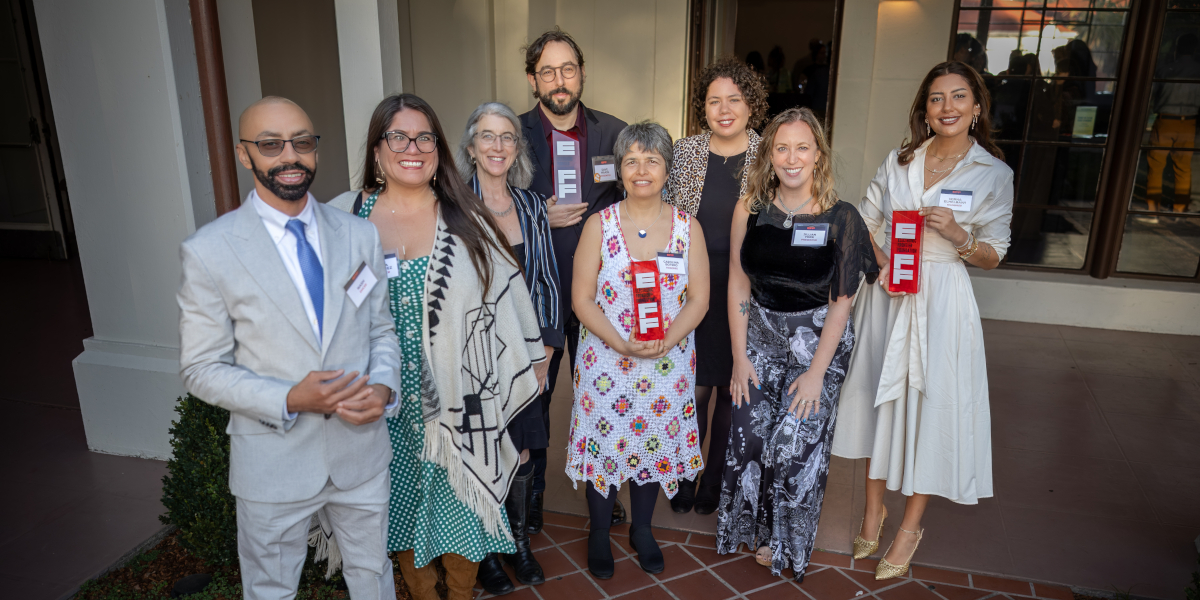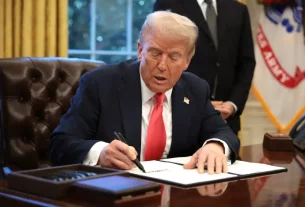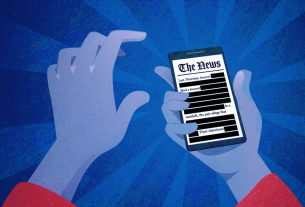Digital freedom and investigative reporting about technology have been at risk amid political and economic strife around the world. This year’s annual EFF Awards honored the achievements of people helping to ensure that the power of technology, the right to privacy and free speech, and access to information, is available to people all over the world.
On September 12 in San Francisco’s Presidio, EFF presented awards to investigative news organization 404 Media, founder of Latin American digital rights group Fundación Karisma Carolina Botero, and Cairo-based nonprofit Connecting Humanity, which helps Palestinians in Gaza regain access to the internet.
All our award winners overcame roadblocks to build organizations that protect and advocate for people’s rights to online free speech, digital privacy, and the ability to live free from government surveillance.
If you missed the ceremony in San Francisco, you can still catch what happened on YouTube and the Internet Archive. You can also find a transcript of the live captions.
EFF Awards Ceremony on YouTube
EFF Executive Director Cindy Cohn kicked off the ceremony, highlighting some of EFF’s recent achievements and milestones, including our How to Save the Internet podcast, now in its fifth season, which won two awards this year and saw a 21 percent increase in downloads.
Cindy talked about EFF’s legal work defending a security researcher at this year’s DEF CON who was threatened for his planned talk about a security vulnerability he discovered. EFF’s Coders’ Rights team helped the researcher avoid a lawsuit and present his talk on the conference’s last day. Another win: EFF fought back to ensure that police drone footage was not exempt from public records requests. As a result, “we can see what the cops are seeing,” Cindy said.
EFF Executive Director Cindy Cohn kicks off the ceremony.
“It can be truly exhausting and scary to feel the weight of the world’s problems on our shoulders, but I want to let you in on a secret,” she said. “You’re not alone, and we’re not alone. And, as a wise friend once said, courage is contagious.”
Cindy turned the program over to guest speaker Elizabeth Minkel, journalist and co-host of the long-running fan culture podcast Fansplaining. Elizabeth kept the audience giggling as she recounted her personal fandom history with Buffy the Vampire Slayer and later Harry Potter, and how EFF’s work defending fair use and fighting copyright maximalism has helped fandom art and fiction thrive despite attacks from movie studios and entertainment behemoths.
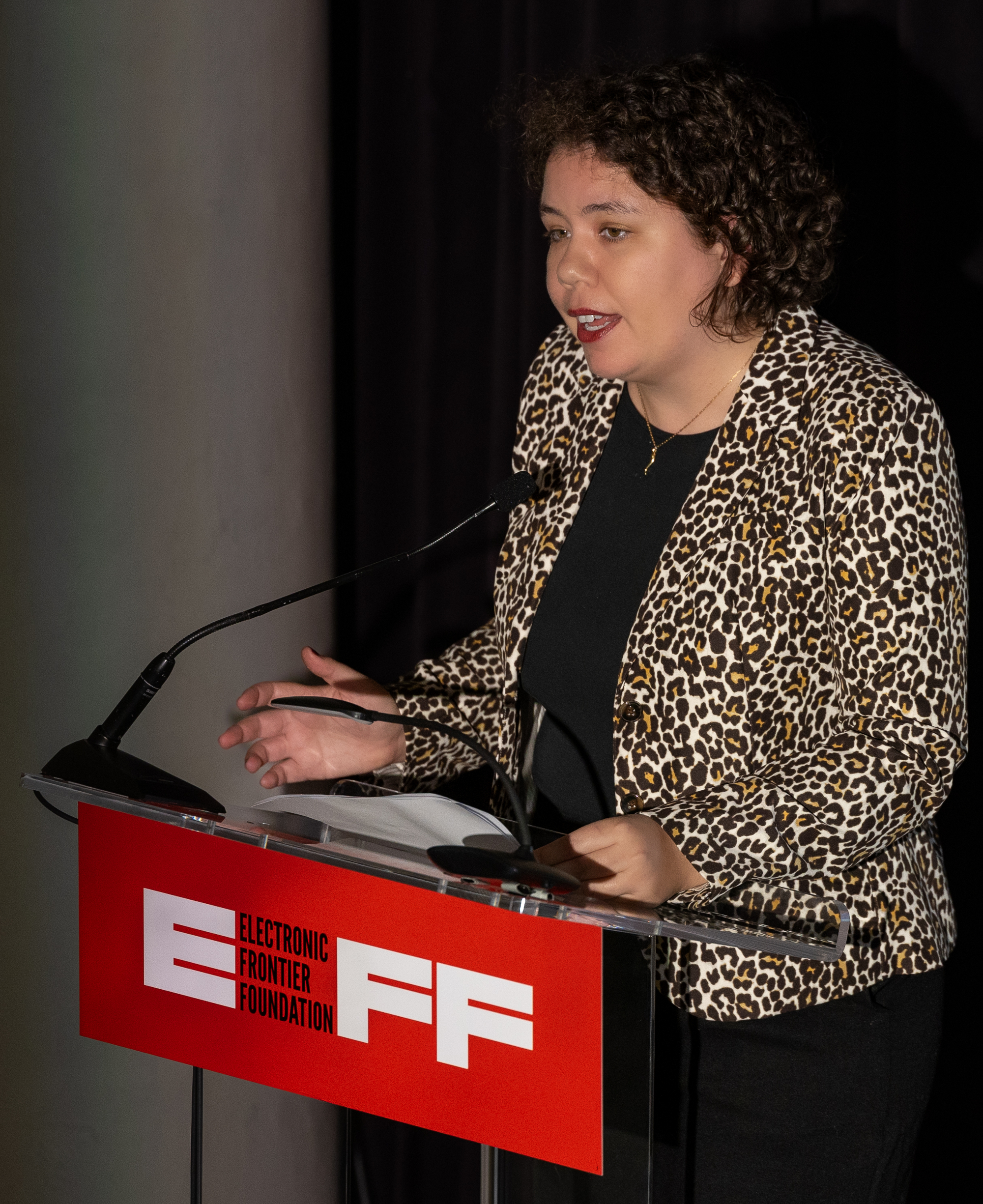
Elizabeth Minkel—co-host and editor of the Fansplaining podcast, journalist, and editor.
“The EFF’s fight for open creativity online has been helping fandom for longer than I’ve had an internet connection,” Minkel said. “Your values align with what I think of as the true spirit of transformative fandom, free and open creativity, and a strong push back against those copyright strangleholds in the homogenization of the web.”
Presenting the first award of the evening, EFF Director of Investigations Dave Maass took the stage to introduce 404 Media, winner of EFF’s Award for Fearless Journalism. The outlet’s founders were all tech journalists who worked together at Vice Media’s Motherboard when its parent company filed for bankruptcy in May 2023. All were out of a job, part of a terrible trend of reporter layoffs and shuttered news sites as media businesses struggle financially.
Journalists Jason Koebler, Sam Cole, Joseph Cox, and Emanuel Maiberg together resolved to go out on their own; in 2023 they started 404 Media, aiming to uncover stories about how technology impacts people in the real world.
Since its founding, journalist-owned 404 Media has published scoops on hacking, cyber security, cybercrime, artificial intelligence, and consumer rights. They uncovered the many ways tech companies and speech platforms sell users’ data without their knowledge or consent to AI companies for training purposes. Their reporting led to Apple banning apps that help create non-consensual sexual AI imagery, and revealed a feature on New York city subway passes that enabled rider location tracking, leading the subway system to shut down the feature.
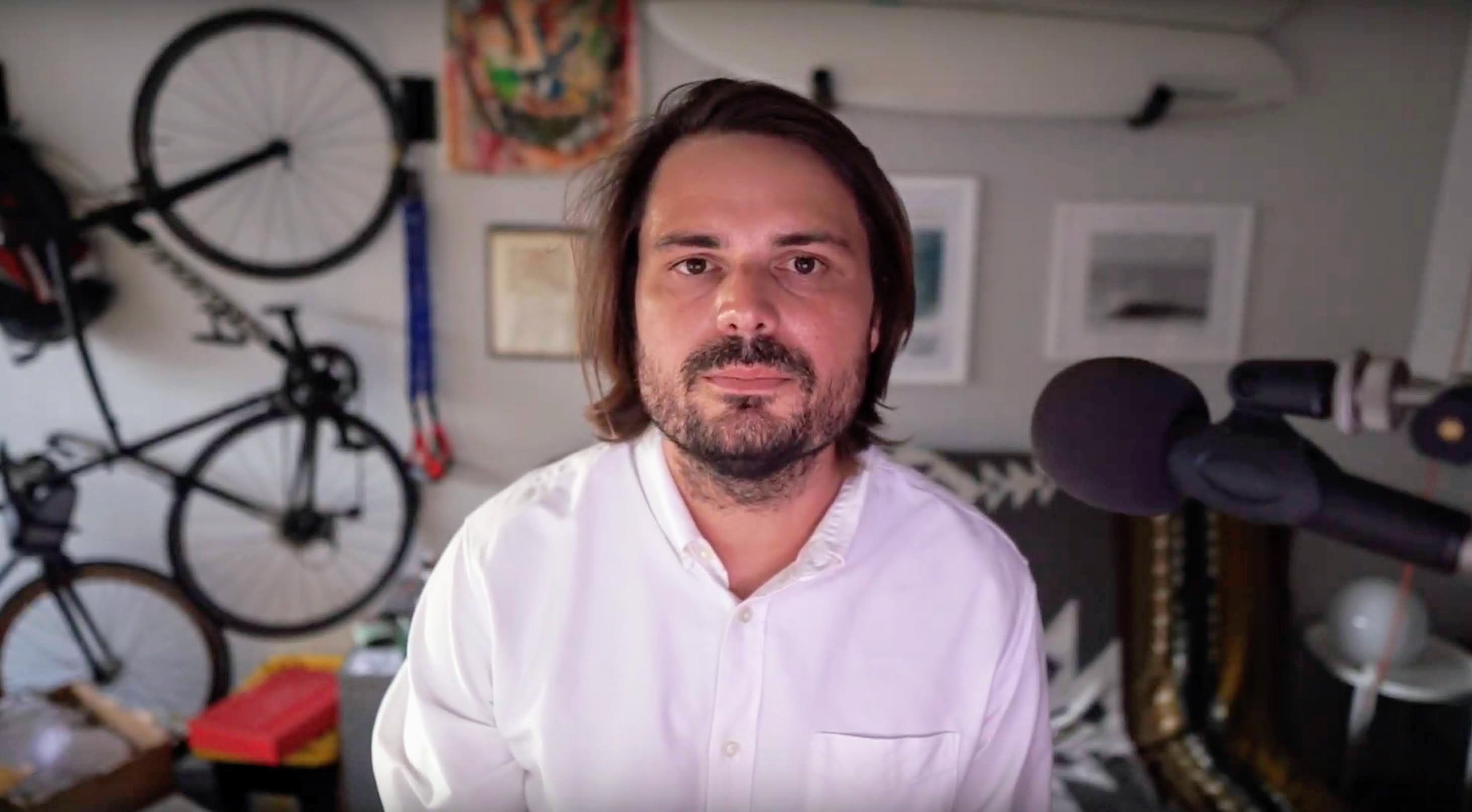
Jason Koebler remotely accepts the EFF Award for Fearless Journalism on behalf of 404 Media.
“We believe that there is a huge demand for journalism that is written by humans for other humans, and that real people do not want to read AI-generated news stories that are written for search engine optimization algorithms and social media,” said 404 Media’s Jason Koebler in a video recorded for the ceremony.
EFF Director for International Freedom of Expression Jillian York introduced the next award recipient, Cairo-based nonprofit Connecting Humanity represented by Egyptian journalist and activist Mirna El Helbawi.
The organization collects and distributes embedded SIMs (eSIMs), a software version of the physical chip used to connect a phone to cellular networks and the internet. The eSIMS have helped thousands of Gazans stay digitally connected with family and the outside world, speak to loved ones at hospitals, and seek emergency help amid telecom and internet blackouts during Israel’s war with Hamas.
Connecting Humanity has distributed 400,000 eSIMs to people in Gaza since October. The eSIMS have been used to save families from under the rubble, allow people to resume their online jobs and attend online school, connect hospitals in Gaza, and assist journalists reporting on the ground, Mirna said.
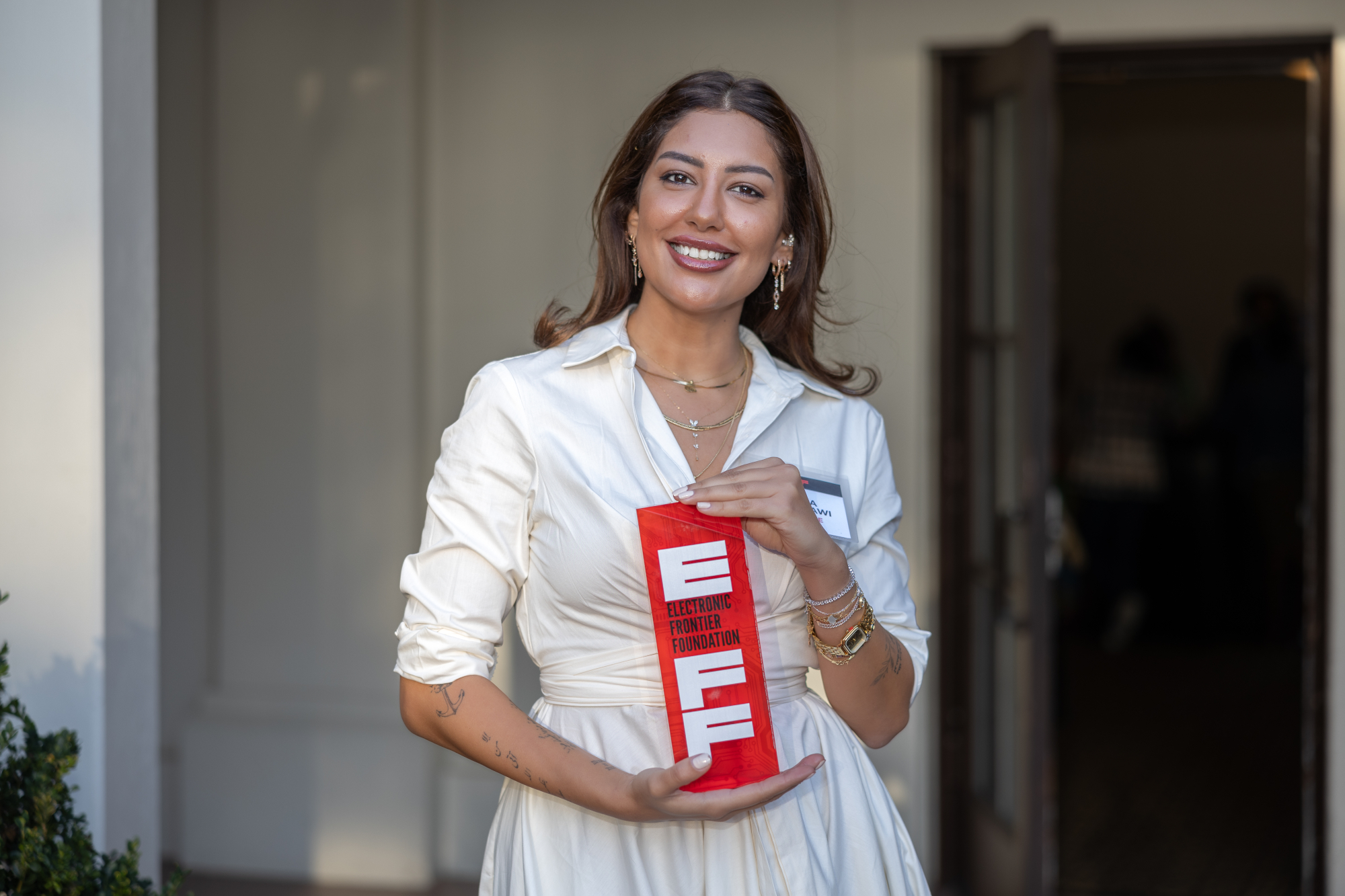
Mirna El Helbawi accepts EFF Award on behalf of Connecting Humanity.
“This award is for Connecting Humanity’s small team of volunteers, who worked day and night to connect people in Gaza for the past 11 months and are still going strong,” she told the audience. “They are the most selfless people I have ever met. Not a single day has passed without this team doing their best to ensure that people are connecting in Gaza.”
EFF Policy Director for Global Privacy Katitza Rodriguez took the stage next to introduce the night’s final honoree, Fundación Karisma founder and former executive director Carolina Botero. A researcher, lecturer, writer, and consultant, Carolina is among the foremost leaders in the fight for digital rights in Latin America.
Karisma has worked since 2003 to put digital privacy and security on policymaking agendas in Colombia and the region and ensure that technology protects human rights.
She played a key role in helping to defeat a copyright law that would have brought a DMCA-like notice and takedown regime in Colombia, threatening free expression. Her opposition to the measure made her a target of government surveillance, but even under intense pressure from the government, she refused to back down.
Karisma and other NGOs proposed amending Brazil’s intelligence law to strengthen monitoring, transparency, and accountability mechanisms, and fought to increase digital security for human rights and environmental activists, who are often targets of government tracking.
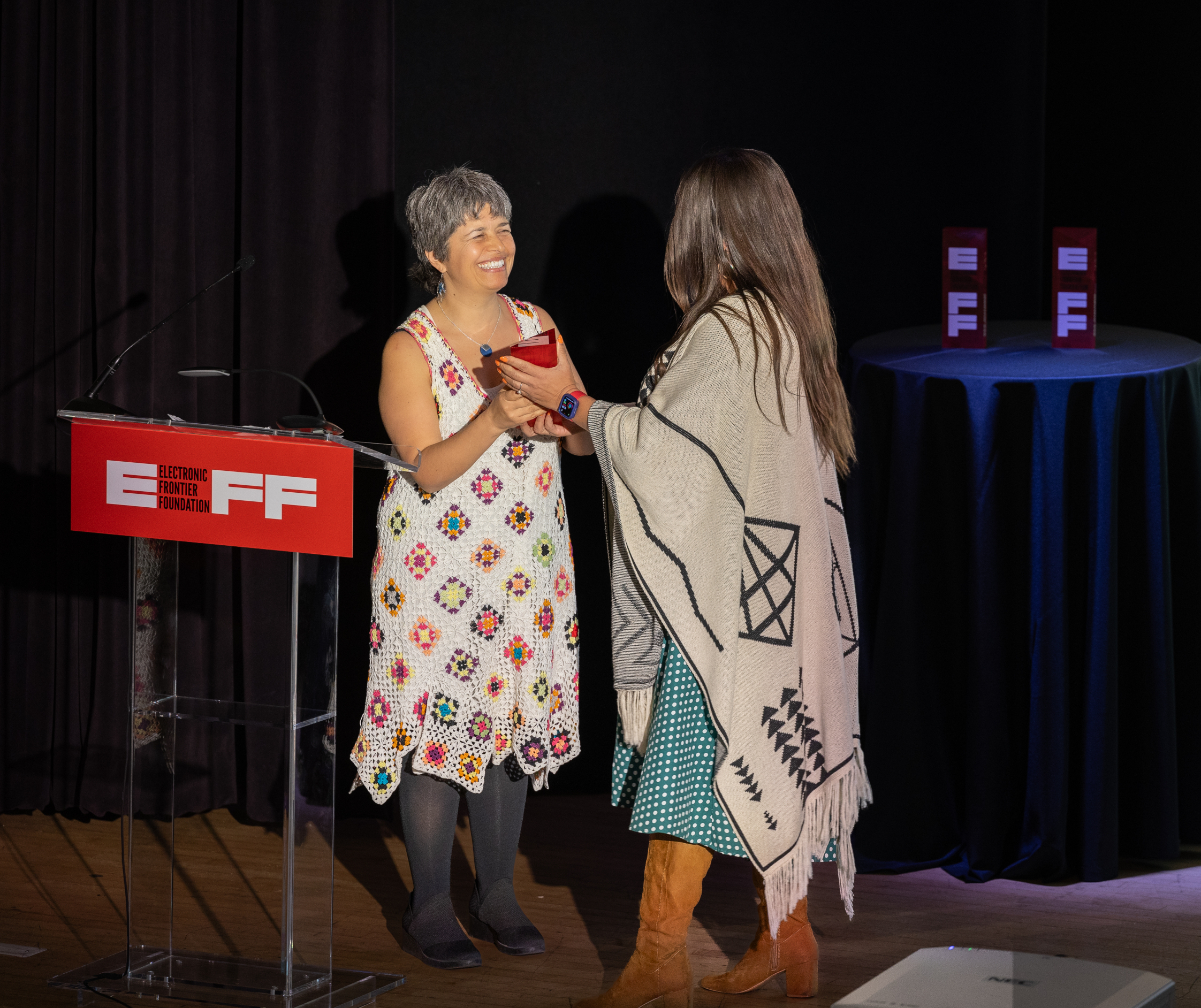
Carolina Botero receives the EFF Award for Fostering Digital Rights in Latin America.
“Quiet work is a particularly thankless aspect of our mission in countries like Colombia, where there are few resources and few capacities, and where these issues are not on the public agenda,” Carolina said in her remarks. She left her position at Karisma this year, opening the door for a new generation while leaving an inspiring digital rights legacy in Latin America in the fight for digital rights.
EFF is grateful that it can honor and lift up the important work of these award winners, who work both behind the scenes and in very public ways to protect online privacy, access to information, free expression, and the ability to find community and communicate with loved ones and the world on the internet.
The night’s honorees saw injustices, rights violations, and roadblocks to information and free expression, and did something about it. We thank them.
And thank you to all EFF members around the world who make our work possible—public support is the reason we can push for a better internet. If you’re interested in supporting our work, consider becoming an EFF member! You can get special gear as a token of our thanks and help support the digital freedom movement.
Of course, special thanks to the sponsors of this year’s EFF Awards: Dropbox and Electric Capital.
